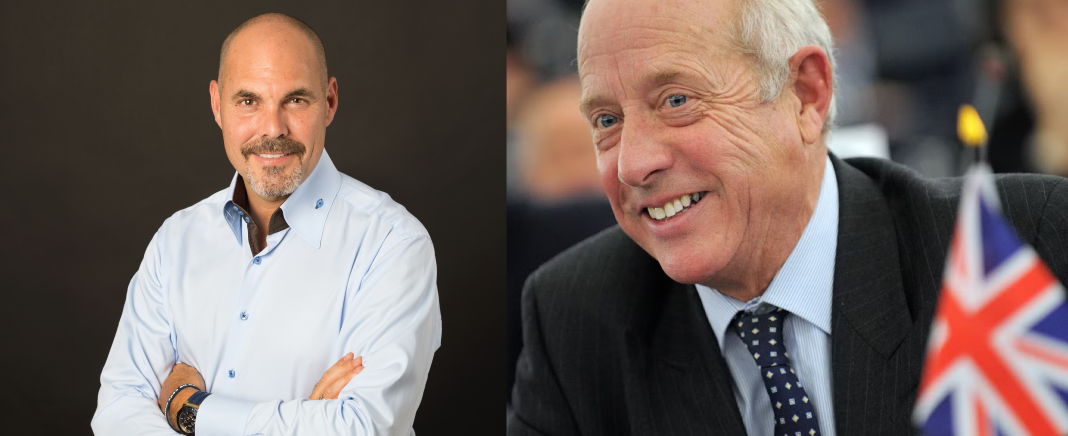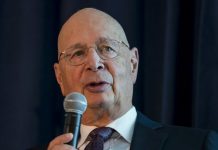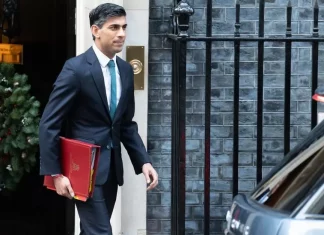Godfrey Bloom Interview With Claudio Grass – Parts 1 & 2
Original Articles On Claudio’s Website
https://claudiograss.ch/2022/10/the-british-people-are-politically-homeless/
https://claudiograss.ch/2022/10/the-british-people-are-politically-homeless-2/
***
A lot has been said and written about Britain’s political and economic woes since Brexit, and even more so over the last two years. Overwhelmingly, mainstream media coverage has been negative and many of the nation’s problems have been blamed on Brexit itself. The role of the lockdowns, the forced business closures and especially of the extreme fiscal and monetary interventions during the Covid crisis has been downplayed, or often gone entirely unmentioned.
Today, Britain finds itself in a similar position with most Western economies: spiraling inflation, an energy crisis, and countless households struggling with the “eat or heat” dilemma. How the British people found themselves in this position, who’s to blame and what happens next are among the core themes I discussed with Godfrey Bloom in the following, very illuminating, interview.
Before entering the world of politics in 2004, Godfrey Bloom worked in the City of London for forty years and won fixed interest investment prizes. He served as a Member of the European Parliament (MEP) for a decade and became widely known as a vocal opponent of government regulation and centralization. A firm euro-skeptic, Bloom was also heavily involved in the Brexit “Leave” campaign as an independent activist. He is an Associate Member of the Royal College of Defense Studies, holds the Territorial Decoration, Sovereign’s Medal, European Parliamentary Medal and Westminster Armed Forces Parliamentary Medal. He is also an author with seven books to his credit. He is married to one of Europe’s leading equine physiotherapists.
————-
Claudio Grass (CG): It’s been a tumultuous few years for the UK, from the Covid crisis and the instability of the Johnson government to its collapse and the race for the next PM and leader of the Conservative party. What do you think the impact has been on the public, after all these extreme phases and the “exercises in democracy” that followed?
Godfrey Bloom (GB): Boris Johnson is a charismatic character, a rarity in modern British politics, a popular figure who stormed into office with the well-received catchphrase “Get Brexit done”. It appealed to 17.5 million voters who voted for Brexit and to many who just wanted closure. He returned with a majority of 80, a big one by contemporary standards, and he got a form of Brexit done.
Britain withdrew its commissioner and MEPs, but remains bound by historic EU regulations. The disastrous Brexit negotiations by an EU-devoted civil service meant that a real Brexit was nigh on impossible. Both the House of Commons and Lords are also staunch Remainers, so with no political will, a form of associate membership is in place. Britain still sends billions to the EU in an extraordinary arrangement, as if somehow Britain is a supplicant nation and not the EU’s biggest customer. Boris Johnson was and is a reluctant Brexiteer. For him it was a political opportunity, a route to Number Ten.
The problem for the Conservative party is it has long since morphed in to a neo-socialist green party with all the disastrous fiscal outcomes that could be expected. Mass immigration, the highest tax burden since the war and collapsing public services have disillusioned the electorate. Charisma can only take politicians so far; electorates want results.
Moreover, Johnson is a habitual liar and cheat. The suicidal lockdown policy, his chancellor’s amazing disregard for fiscal probity and his health ministers’ constant denial of medical and actuarial data gave the country a government which nobody trusted.
As ordinary working people saw the folly of net zero, billions in unaudited foreign aid and a bizarre disregard for caution confronting a leading military and nuclear power in the Ukraine, the electorate simply withdrew support in local elections. With a hostile MSM, civil service and back bench MPs, Johnson could not survive nor did he. Basically, middle England feels disenfranchised, politically homeless and depressed.
CG: Watching the leadership race debates and the interviews, as an outsider, it seemed like the UK was “inspired” by the US a bit too much this time, as there was a lot of drama and cinematic tension and “soundbites” for the press to pick up, but not a lot of substance. What did you make of the race and did you see a candidate that you thought would have made a better leader than Liz Truss? Why do you think Truss eventually prevailed and do you think she did so for the right reasons?
GB: The Conservative Party leadership was a schism, the members of Parliament did not want Johnson but another, more disciplined, less dishonest and more discreet leader, who adhered to EU negotiating compromise, World Economic Forum strategy, US foreign policy and tax-and-spend neo-socialist policies. The green agenda still remains sacrosanct in spite of its disastrous impact and the war with Russia.
The Conservative party membership who make the final call were basically denied a radical true Conservative option. No serious tax reform, public spending discipline, curtailment of mass immigration, NHS or BBC reform. State education is a disaster with the abandonment of family values, sex education for eight-year old’s and continued climate fanaticism. Add to that the continuance of a politicized police and judiciary and the abandonment of the principles of English Law. In short, the same failed Johnson government agenda without the burden of Johnson’s embarrassing peccadillos. Truss beat the architect of the nation’s financial demise, Rishi Sunak, who tried to pretend it was nothing to do with him! Ludicrous.
The real problem is with the Western political class. It is at an all-time post-war low, compounded by a politicized media, deeply committed to a WEF agenda. Dissent is forbidden and we see censorship worthy of Stalin’s Soviet Union. The latter is perhaps the most serious, a free press is the shield on which a democracy thrives. Couple this with two generations of people without the benefit of a traditional education, a capacity for risk assessment or critical thinking.
CG: Truss recently had to reverse her move to scrap the highest Income tax rate, in a very public and very humiliating manner. What do you make of this decision and do you think this reversal could dent the new PM’s credibility?
GB: The Truss U-turn clearly demonstrates now that aforementioned schism in the Tory party, unseen since the abolition of the Corn Laws. Tax in Britain is not about raising revenue but political grandstanding.
Income tax now has a higher tax rate than under the last Labour government. The tax concessions were peanuts. The Conservative Party has been infiltrated by crypto socialists for over thirty years and the current government is on the left of the last Labour government. The party needs a period in opposition to return to its fundamental principles, the party of Lord Salisbury, a libertarian by modern day standards. Truss has been exposed as weak. She might not survive.
CG: The “cost-of-living” crisis has been making headlines regularly in the UK, and by now, the impact on virtually every household is quite apparent. While the effects of it have been very extensively discussed and analyzed in the media, the causes of it haven’t received the same coverage. Most of the time, Vladimir Putin is blamed and the Ukraine war. Do you think this is the whole story? Is inflation a problem that is exclusively caused by the war?
GB: As libertarians and free marketeers foretold, out of control public spending, high taxes, borrowing and money printing would cause high inflation. Green policies have been disastrous, and the extraordinary overreaction to Covid and the NATO-provoked war in the Ukraine have exacerbated it. But there has been no western admission. Green policies, war mongering, mass immigration, Keynesian economics and fiat currency have brought the West to its knees. So we can expect more of the same.
The WEF is not yet realized as a global political force. 80% of the electorate as yet have not even heard of it. But those who have, now believe the West has gone past political incompetence and has embarked on a serious attempt to destroy our civilization and replace it with a new world order. The professional classes under forty years old don’t care, the artisan class know something is very wrong but can’t put their finger on it. The British people are politically homeless. No good can come of it.
***
Claudio Grass (CG): With everything that’s been going on, it could be argued that very few of Liz Truss’s predecessors had worse luck in their first month in office. The Queen’s death dominated international mainstream media for weeks and it reignited a lot of old debates about Britain’s past and about the monarchy itself. What is your own view on the monarchy? Is it just a useless relic and a burden on the taxpayer?
Godfrey Bloom (GB): The death of Her Majesty was neither unexpected nor, obviously, unprecedented. The funeral and period of mourning showed the deep-rooted strength of the monarchy and it certainly didn’t trigger any republican feeling in Britain. Remember we had a civil war in the 1600s, which overthrew the monarchy, and we tried a Republic which lasted thirteen years. It failed when Cromwell died and nobody here really wants another go.
Let me explain how it works, especially for the benefit of any American readers who are usually foggy about it: Britain is a constitutional monarchy and a parliamentary democracy. Warts and all, it has worked pretty well in its current form for four centuries.
It is funded by an agreement between the Crown and the Parliament, where the Parliament gets income from Crown estates in exchange for a payment known as the civil list. This parliamentary payment is about half of the Crown Estate income. There are tax concessions, but the Royal family would be much better off as private citizens.
Let’s look at the constitutional position. The electorate vote for the party which offers a manifesto to their liking. If that party wins, it forms a government. An election comes every four or five years on average. Laws are proposed in the form of a bill, it goes to the Lords (the amending chamber), then voted on, and if passed, it goes to the monarch for royal assent. The monarch is ruled by the constitution (not written in one document as in the USA but a constitution nonetheless), also the monarch’s coronation oath.
The system works. It built the biggest, most benevolent empire the world has ever seen. (See Prof. Neil Fergusson late of Jesus College Oxford book “Empire”). I know this annoys libertarians, but only those with a poor knowledge of global modern history.
Now where the system suffers is when a royal house is dysfunctional, like the Windsors and when the monarch reneged on the coronation oath as Queen Elizabeth II did and as Charles III probably will. The British overthrow dynasties or they die out: Plantagenets, Tudors, Stuarts, and the Windsors too, I suspect, as Charles associates himself with gangsters in the WEF, oligarchs and celebrities and meddles in green politics. Our membership of the EU was illegal under our constitution and I believe the monarchy also abrogated their responsibilities in the great lockdown. This was an opportunity for a monarch to use the vital role of arbiter within the constitution, a very rare event.
As for Truss, any astute politician could have used the passing of Elizabeth to advantage. She is not astute, nor has she I suspect the depth of intellect or conviction to succeed.
CG: From an economic perspective, it could be argued that even though Truss won, she lost – in the sense that she assumed control of an economy that is not dissimilar to the Titanic after it hit the iceberg. In your view, why would anyone even want this position and do you think there’s anything that can be done at this point to salvage the situation?
GB: The Western economic situation is dire, but it is not beyond saving. At the risk of sounding parochial here is what she could and should do.
- Abandon High Speed Rail2 (a monumentally expensive railway nobody wants)
- Abandon the NHS in its current form and adopt the German system (ironically close to the original NHS concept under Beveridge in 1943)
- Disestablish the 1000 quasi non-governmental departments
- Cancel all foreign aid, including war material to the Ukraine
- Cancel the ruinous public sector’s index-linked pensions scheme
- Reduce the civil service from 6 million to 500,000
- Repatriate all illegal immigrants as a matter of urgency
- Mobilize the Royal Navy Dover patrol to turn back people-trafficking boats.
- Leave NATO, a complete and dangerous anachronism.
- Reduce universities to a manageable number with minimal government funding. Education is not a legitimate role of the State.
This would save £1.3 trillion and the UK current account would balance. Also, essential steps would be deep-rooted permanent tax cuts for the future and a constitutional ceiling on government spending of 7% of GDP, as well as a return to hard money, asset-backed, with a combination of precious metals, land and a basket of commodities.
CG: What is your understanding the role that the Russian gas pipelines played in the Ukraine conflict?
GB: The US president and his senior colleagues were quite up front about the destruction of the Russian pipelines. They said they would do it and they did. Washington has also made no secret of the desire for regime change in Russia, as in Panama, Grenada, Syria, Iraq, Somalia, Afghanistan, Libya et al.
America has 800 overseas bases, 200,000 overseas military personnel, eleven aircraft carriers, a $ trillion annual military budget. The USA has a social attitude to the military akin to 19th century Prussia. It’s been in a war of some sort almost continuously from 1776 !
The country’s leadership has no moral compass. It has abandoned its constitution, it is a secular society run by the military industrial complex of which Eisenhower warned in 1960. Its foreign policy is dictated by an institutionally psychopathic and unaccountable CIA of which Kennedy warned. This has brought a great nation to financial and moral bankruptcy in possible terminal decline.
Britain must reluctantly disassociate itself from what is now a rogue state and await a new leadership to draw it back from the brink. As with America, the EU has lost its way too. It has degenerated into a centralized neo-socialist state, not wedded to war, but instead to green politics and welfare. A loose confederation of like-minded classical liberal countries is now a bankrupt monstrosity.
Britain has nearly escaped its clutches, but has not severed the cord completely, because the political and bureaucratic class actually want Brexit to fail. But it is irrelevant anyway. The global future is in the Shanghai Cooperation Organization. The West must understand that and realize the future of Europe is there and the West must defer or decline. Africa, the BRICS nations & even the Indian subcontinent are on board. Denial is futile.
CG: In your opinion, not just in the UK but also in most “advanced” economies, is there anything that can be done at this point to avoid a hard recession or a long and painful inflationary period? What would be your advice to a conservative and responsible investor who is seeking to protect his savings during these uncertain times?
GB: There are some serious obstacles in the way of success. The West has two generations of electorates committed to state solutions to every problem, when libertarians know the State is the problem. All Western democracies today face problems caused by their politicians, not as they would have you believe, some force majeure. History shows, when society collapses, people ironically call for more government, not less. This is how we got Napoleon, Stalin, Hitler, Mao, Franco, Mussolini.
What should an investor actually do? Well, don’t invest at this stage of the cycle. Wealth preservation is the key. Gold is the historic preserver of wealth as it has been for five thousand years. Gold held in specie, that is, not paper gold. Locked away where it is difficult to steal.
No, I don’t mean burglars. I mean the government, YOUR government, wherever you live.
Claudio Grass, Hünenberg See, Switzerland






